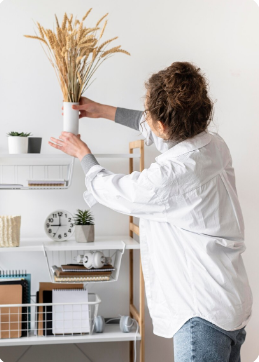Have you ever noticed how cleaning your desk clears your mind? Or how organizing a drawer brings a sense of relief that goes beyond the physical space? That’s because organization and well-being are deeply connected.
When your environment is cluttered, your brain often mirrors that chaos. But when things are in order—visually and mentally—your stress levels drop, your focus sharpens, and your emotional balance improves.
In this article, we’ll explore how organization supports your mental health, emotional resilience, and overall quality of life. Plus, you’ll find easy, practical tips to start organizing today—without overwhelm.
Clutter Isn’t Just Physical—It’s Mental Too
A cluttered space doesn’t just look messy—it can make your mind feel scattered, restless, and anxious.
Why? Because your brain has to constantly process and filter excess information. Every pile, mess, or “I’ll deal with it later” creates a small mental alert.
Over time, these alerts add up and lead to:
- Difficulty concentrating
- Higher cortisol (stress hormone) levels
- Lowered motivation and mood
- Decision fatigue
Decluttering your environment is like decluttering your mind—and the impact is immediate.
1. Clean Space = Clearer Thinking
When your surroundings are tidy, your brain doesn’t have to work overtime managing visual distractions. This improves:
- Mental clarity
- Focus and productivity
- Ability to complete tasks
Try this: Clear your workspace before starting something important. Notice how much easier it is to concentrate and finish what you start.
Even five minutes of tidying can set the tone for a calmer, more focused day.
2. Organization Reduces Stress and Anxiety
Messy environments can cause constant low-level stress. You may not notice it until you clear the clutter—and feel your whole body relax.
Organizing gives you a sense of:
- Control over your surroundings
- Certainty in your routine
- Peace from visual and mental chaos
Start small: a single drawer, your nightstand, or your inbox. Each organized space becomes a calm zone for your mind.
3. Routines Bring Emotional Stability
Organization isn’t just about where things go—it’s also about how you move through your day.
Simple, repeatable routines help your nervous system feel safe and supported. They create rhythm and predictability, which reduces emotional swings.
Helpful routines include:
- Morning and bedtime rituals
- Planning meals or outfits ahead of time
- Setting time blocks for work, rest, and play
The more structure your day has, the more space your mind has to breathe.
4. Organized Environments Support Better Sleep
A messy bedroom or cluttered nightstand can subconsciously keep your brain alert, even when you’re trying to rest.
To improve sleep through organization:
- Clear your nightstand of distractions (devices, paperwork, etc.)
- Keep only sleep-supportive items nearby (a book, water, a lamp)
- Make your bed each morning—it signals completion and calm
- Keep your bedroom cool, dark, and tidy
A peaceful space invites peaceful rest.
5. Decision Fatigue? Organization Helps
Every choice you make in a day uses mental energy. When things are disorganized, you spend more time and effort deciding:
- What to wear
- What to eat
- Where your keys are
- When to do certain tasks
An organized system reduces decision fatigue by creating flow and predictability. That means more energy for the things that really matter.
6. You Feel More in Control of Your Life
Feeling out of control is a common source of stress. Organizing even one part of your life—like your finances, your pantry, or your digital files—can create a ripple effect of confidence.
Each organized space says:
“I’m capable. I’m taking care of myself.”
That message builds emotional resilience and personal empowerment.
7. Physical Movement Reduces Mental Tension
The act of organizing—folding, sorting, placing—can be soothing and therapeutic. It creates movement, rhythm, and focus, pulling you into the present moment.
Think of it as a form of moving meditation. And when the task is done, you get a double reward:
- A more peaceful space
- A calmer, clearer mind
Easy Ways to Start Organizing Without Overwhelm
You don’t need to become a minimalist or decluttering pro overnight. Small steps are powerful.
Try these simple habits:
- The 5-minute rule: If it takes less than 5 minutes, do it now
- One-in, one-out: For every new item, remove one
- Daily reset: Take 10 minutes to tidy surfaces at the end of the day
- Sunday prep: Set up your week with meal plans, calendar checks, and outfit choices
Choose one area or habit to focus on each week. Over time, your space—and your mind—will begin to feel lighter.
Your Outer Space Affects Your Inner State
Organization isn’t about perfection. It’s about creating an environment that supports how you want to feel—calm, focused, in control, and at ease.
When your space flows, so does your energy. When your routine makes sense, your emotions settle. And when you feel aligned inside and out, life feels more manageable.
So take a deep breath. Pick one drawer, one corner, or one habit—and begin. You’ll be amazed how much lighter you feel.
